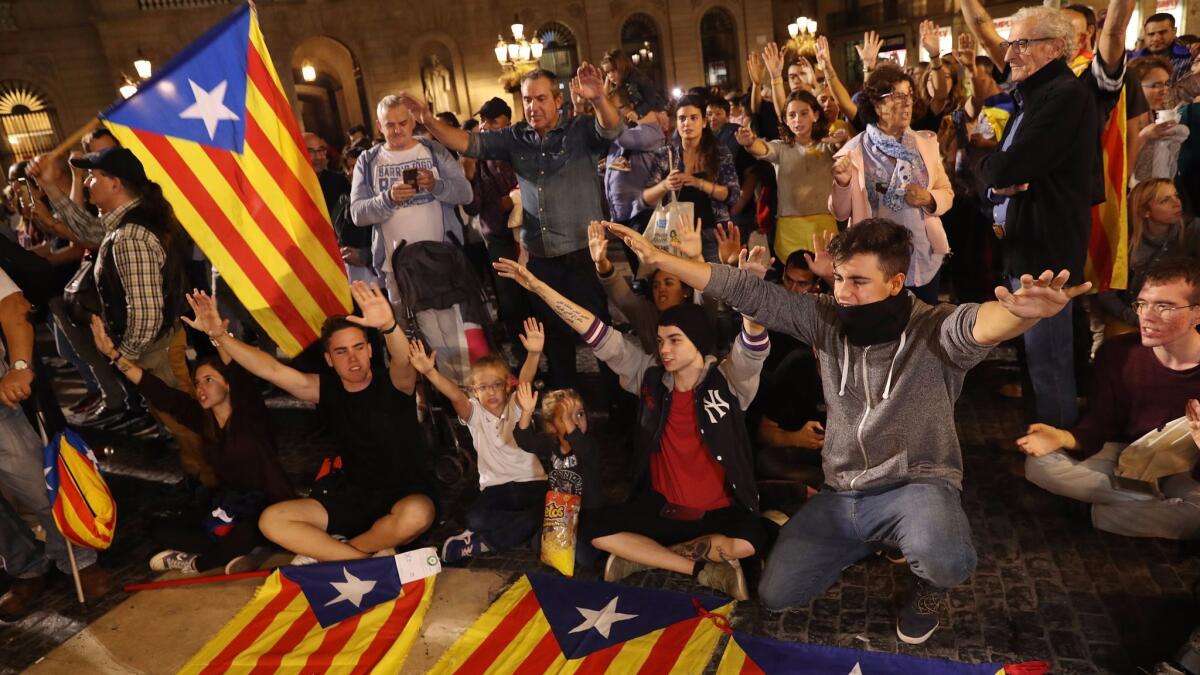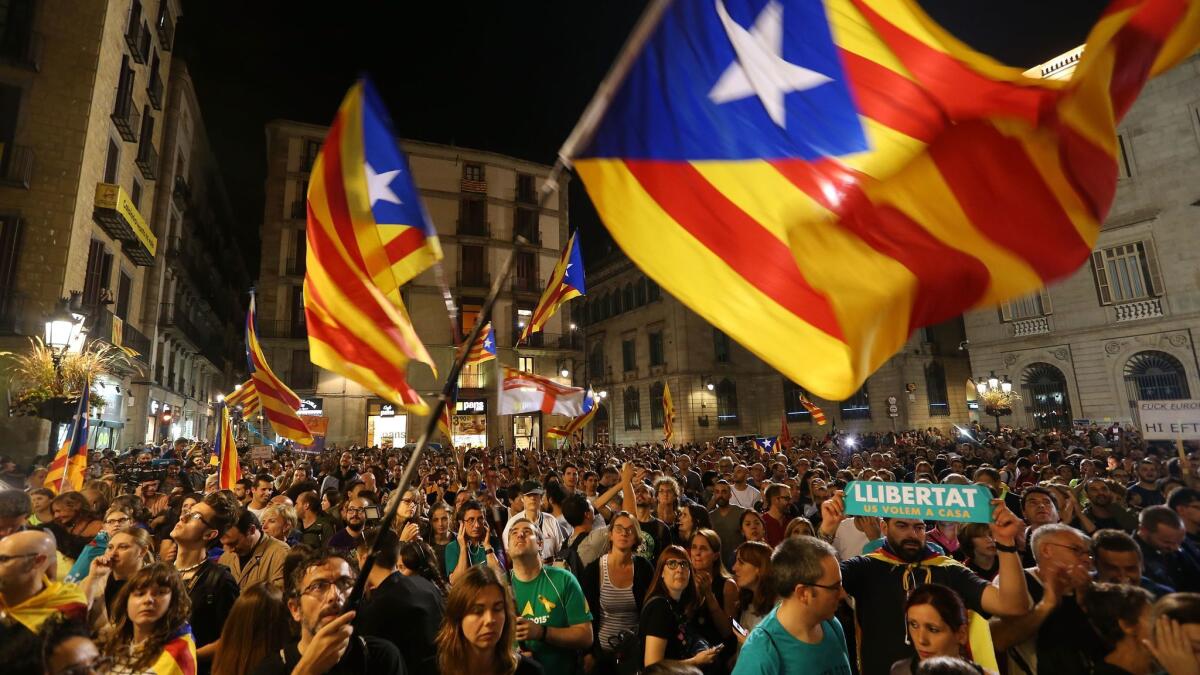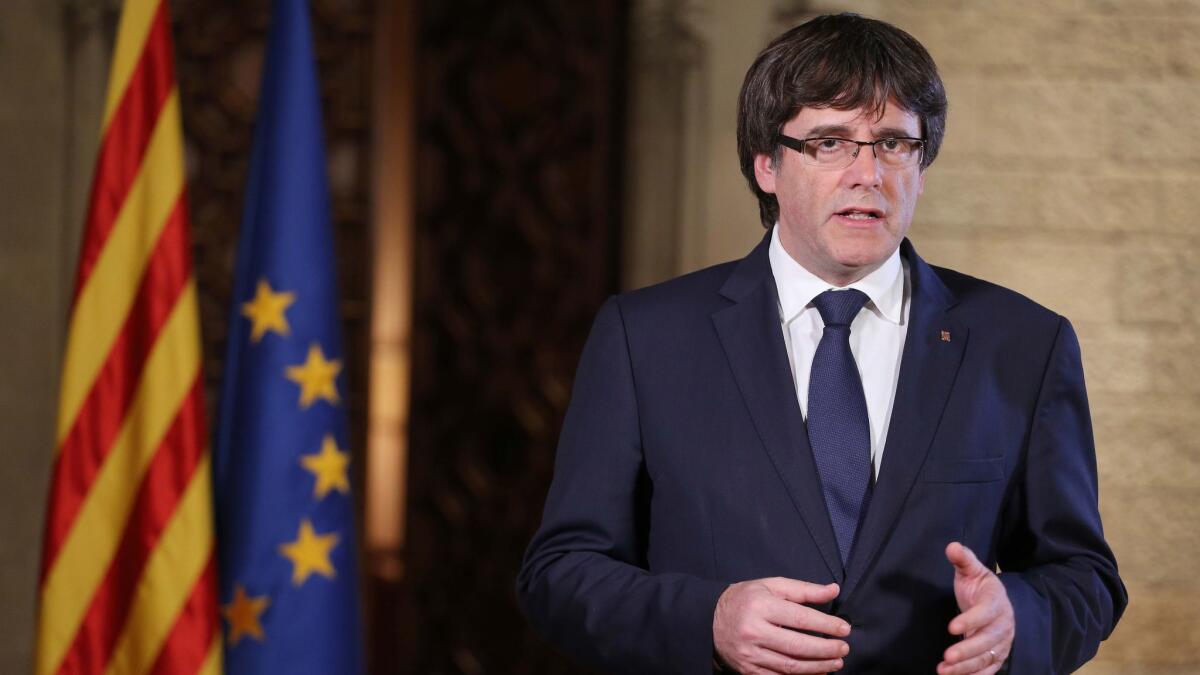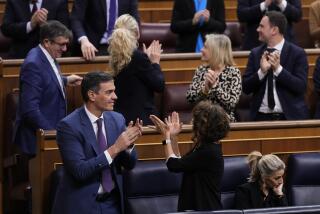Separatist leader vows to defend Catalonia’s sovereignty after Spanish premier seeks to oust regional government

Reporting from Madrid — Spanish Prime Minister Mariano Rajoy announced plans Saturday to fire the Catalan president and force fresh elections in the separatist-led region, invoking a constitutional clause never used in the four decades since Spain’s transition from dictatorship to democracy.
It was a drastic crackdown following a flurry of ultimatums, street protests and violence that followed a disputed independence referendum three weeks ago. The unrest has prompted an exodus of banks and businesses from Catalonia, threatening the economic stability of Spain’s wealthiest region.
Word that Spain would invoke Article 155 of its Constitution — suspending Catalonia’s regional powers — sent thousands of protesters into the streets of the Catalan capital, Barcelona, and prompted a harsh rebuke from soon-to-be-deposed separatist leaders there.
“We cannot accept this attack,” Catalan President Carles Puigdemont said, looking ashen in televised address late Saturday. “It is incompatible with a democratic attitude and the rule of law.”
Outside, protesters called the takeover a “coup” and chanted, “Not one step more!”
When Spaniards ratified their Constitution in 1978, survival of the then-fledgling democracy was thought to rest on the devolution of powers to 17 autonomous regions, which run their own health and education systems but rely on Madrid for tax collection and other services. The arrangement reversed the centralized power of the late dictator Francisco Franco.
Rajoy sought to upend that arrangement for the first time Saturday in Catalonia, where the local language and culture were repressed under Franco.
Pending Senate approval late next week, the Spanish central government would take over governance of the wealthy northeast region, replacing all government ministers and taking control of the local police force, known as the Mossos, as well as the public broadcaster TV3, according to a document drafted by Cabinet ministers, a copy of which was obtained by The Times.
“The government had to enforce Article 155. It wasn’t our desire, nor our intention. It never was,” Rajoy told reporters in Madrid. “But in this situation, no government of any democratic country can accept that the law is ignored.”
Moments after Rajoy’s speech, people emerged onto balconies across Barcelona, clanging pots and pans together in a chorus of dissent.
On Oct. 1, Catalan separatist leaders presided over an independence referendum which Spanish courts had ruled illegal. Some 90% of ballots cast were for secession, but more than half of Catalans did not participate, and the polling was disrupted by Spanish police.
Puigdemont nevertheless claimed a mandate for independence.
“I’m a Catalan and only that — not Spanish. They don’t represent me,” said Ana Carnet, 63, a housewife and pro-independence protester in the Barcelona crowd Saturday. “Now our [Catalan regional] government has to do only one thing: declare independence. We are waiting for that.”
A small far-left pro-independence party in Puigdemont’s ruling coalition has called for an immediate unilateral declaration, and suggested the Catalan government could go into exile across the border in Perpignan, France. Puigdemont said Saturday he would ask the Catalan parliament to convene and debate, in the coming days, what he called the “liquidation” of Catalonia’s self-rule.

But they have less than a week before the Spanish Senate is expected to pass Rajoy’s Article 155 measures, under which the Catalan parliament would be barred from passing any new laws without approval first by Madrid.
Puigdemont said such limitations were an “attempt to humiliate” Catalonia. Speaking in the Catalan language, he said Article 155 represents “the worst attack” on Catalonia’s democracy since the Franco era.
Then he switched into English, which he rarely speaks in public, and addressed Europeans.
“We are doing what we are doing because we believe in peaceful democratic values,” Puigdemont said. “What we are fighting — what you are fighting for — is exactly the same thing.”
At a European Union summit in Brussels this past week, EU officials reiterated their long-held position that Catalan separatism is an internal Spanish matter. They said the bloc would not send mediators.
Rajoy said he was not revoking Catalonia’s autonomy, but rather “restoring normality and coexistence.”
He appealed to companies to halt an exodus from the northeast region. Dozens of Catalan banks and other businesses have relocated to other Spanish regions, or have indicated they would do so, if Catalonia breaks away from Spain and thus the EU.
Rajoy reminded Catalans that the whole country has just emerged from a punishing economic recession.
“Economic recuperation today in Catalonia is in danger — in evident danger — because of the capricious and unilateral decisions of [separatist leaders] there,” Rajoy said.
With 7.5 million residents, Catalonia is Spain’s economic engine, contributing about a fifth of Spain’s total gross domestic product and more than a quarter of exports. Its economy is larger than Portugal’s or Finland’s.
Two of the three other main parties in Spain’s national parliament, besides Rajoy’s conservatives, have said they support the prime minister’s crackdown on Catalan separatists. But the far-left Podemos (“We Can”) party said it is opposed to Article 155 measures, and wants the Spanish government to allow Catalans to vote legally on their future — like the UK allowed in Scotland in 2014.
“The most corrupt party in Europe has 8.5% of the votes in Catalonia and will now govern there,” tweeted Podemos MP Pablo Echenique, referring to corruption scandals that have dogged Rajoy’s conservatives, and the party’s share of the vote in Catalonia. “A terrible day for any democrat.”
In the northern Basque region, which for decades saw its own violent separatist uprising, a spokesman for the Basque Nationalist Party tweeted that Rajoy’s “lax and abusive” use of Article 155 “sets a dangerous precedent.”

Frayer is a special correspondent.
UPDATES:
4:55 p.m.: This article was updated throughout with new details including statements from demonstrators and Catalan officials.
3:45 p.m.: This article was updated with Catalan separatist leader Carles Puigdemont joining demonstrators.
12:40 p.m.: This article was updated with comments from Catalan separatist leader Carles Puigdemont.
7:30 a.m.: This article was updated throughout with staff reporting.
This article was originally published at 6:45 a.m.
More to Read
Sign up for Essential California
The most important California stories and recommendations in your inbox every morning.
You may occasionally receive promotional content from the Los Angeles Times.










